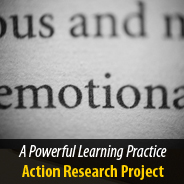Saint Andrew School in Drexel Hill
Team Members: Karen Tomasetti, Marijo Tomasetti, Stefanie Wetzel, Kathy Huff
Community: Archdiocese of Philadelphia Year 1, 2010-2011
How does the teacher’s emotional intelligence affect classroom atmosphere increasing positive student behavior and performance? The results of our 2009-2010 academic year’s “We Teach We Learn” surveys prompted us to explore the issue of emotional intelligence in the classroom. Survey responses strongly indicated a disconnect between what the faculty and students perceived relating to relationship (faculty awareness of the “whole” child, i.e., students’ interests, activities, etc.). Additionally, the need for professional development re: personal evaluation and possible strategies to deal with an increasingly diverse student body has become evident. As a result, we chose to launch an ongoing professional emotional intelligence development project with the long-term objective of evaluating and improving the relationships between faculty and students, among the faculty, and fostering increased student achievement and positive behavior.
Problem: The effect of a teacher’s emotional intelligence on student achievement and behavior.
Issue: The identified need to improve classroom relations and boost achievement by improving faculty emotional intelligence.
Possibility: Long-term benefits to include: increased faculty awareness of self and how they deal with emotionally-charged situations; increased individual discussion between administration and faculty; more pro-social interactions in the classroom; higher student achievement.
By increasing faculty emotional intelligence, we hope to model more pro-social behavior for students, foster their developing self-esteem, and ultimately decrease bullying issues among peers. Each trimester, anonymous student surveys will be used to assess these issues. The faculty will respond to reflective questions posted in a Ning by administration to spark conversations and utilize Web 2.0 technology. Moreover, the surveys will be used as an ongoing discussion/professional development tool between administration and individual faculty members.
- Faculty presentation in June – Pecha Kucha
- Required faculty goal setting and a second viewing of Pecha Kucha in August
- Faculty support/outside sources/training/partnering
- Student surveys conducted each trimester
- Ongoing professional discussion via GoogleDocs and Ning
This project will be launched in June, 2011 and fully implemented throughout the 2011-2012 academic year.
Full project details and artifacts can be found on the
team’s wiki page.
About Action Research Projects
Action research is a process in which Powerful Learning Team members collaboratively examine their own educational practice systematically and carefully. Action research is:
- Disciplined inquiry into a problem or possibility within the school or classroom
- Collaborative and usually takes place in a community of practice
- Meaningful, positive, and reflective
- Data-driven, action-based, improvement-focused
- Transformative
View all Action Research
The following two tabs change content below.

Sheryl is the co-founder and Chief Executive Officer of Powerful Learning Practice. She works with schools and districts from around the world helping them to infuse technology into their curriculums and by leading other digital conversion efforts.
Sheryl also consults with governments, educational organizations and non-profits in development of their various professional learning initiatives.
Sheryl is a sought-after presenter at national and international events, speaking on topics related to digital and online learning, teacher and educational leadership, online community building, and other educational issues impacting children of poverty.
Sheryl served on the International Society for Technology in Education (ISTE) Board of Directors for six years. She co-authored The Connected Educator: Learning and Leading in a Digital Age with Lani Ritter Hall. Sheryl has four children and four grandsons, Luke, Logan, Levi and Tanner and a trio of dachshunds. You can find out more on her blog and on Twitter @snbeach.


